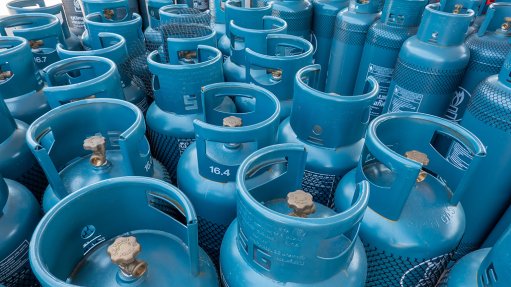Warehouse chain investing in cost effective heating and cooling
Local warehouse chain Makro has been investing in cost-effective ways of heating and cooling its stores and refrigeration systems, says store development manager Alan Walker.
He adds that Makro introduced an initiative to construct “new generation stores” that would be designed for energy efficiency.
“Since 2010, we have been designing new generation stores to save energy, reduce running costs and improve the in-store environment and customer shopping experience, thereby becoming more sustainable,” he explains.
The chain store focused on four areas of energy efficiency – lighting, refrigeration, air conditioning and building and domestic heating – at its new stores, details Walker.
Walker tells Engineering News that all Makro stores that were constructed during and after 2010 prioritised the installation of a range of domestic heating and cooling interventions, which resulted in the stores using reclaimed energy from their air-conditioning and refrigeration plants to heat water used in the building and using reclaimed heat from the stores’ refrigeration plants to provide heat in winter.
Further, in each of the stores one of the air-conditioning chillers has a heat pump facility on standby, should the heating demands of the store exceed the energy received from the refrigeration plant. The condensed air from the heat pump is also used to keep one of the computer hub rooms cool.
In addition, Makro’s new refrigeration plants are 18% more efficient, compared with its legacy store – Makro Silver Lakes – and 35% more efficient than traditional refrigeration plants on the market.
Walker further details that the new refrigeration units use carbon dioxide (CO2) refrigeration gas, which he boasts is non-ozone depleting and has a global-warming potential rating of one.
He explains that global-warming potential ratings provide a measure, relative to CO2, of the heat that a particular greenhouse gas – in this instance the refrigerant gas – traps when released into the atmosphere. Many conventional refrigerant gases have global warming potentials in excess of 1 000 times that of the CO2 that is used in Makro’s refrigeration plants, highlights Walker.
The units also allow for reclaimed condensate water from the air-conditioning and refrigeration units to be used to improve the coefficient of performance (COP) when ambient temperatures exceed 27 °C – enabling the refrigeration unit to achieve a COP of 3.47 in conditions where traditional plants operate at a COP of 2.19.
Walker also mentions that Makro has improved air-conditioning plant performance at its new generation stores by 30% through several interventions, one of which is obtaining 50% of the plant’s cooling capacity from the thermal storage tanks that store energy during low-demand periods.
In addition to the thermal tanks, a fan wall system has replaced the traditional air-handling unit, which comprises a belt-driven fan and a motor system. Walker says this is an advantage, as the fan motors slow down to 60% during the peak demand periods, thereby saving energy.
“We use energy efficient refrigeration plants that are equipped with the latest energy- saving features, automated night blinds and high-speed doors, as well as better insulation, to reduce temperature loss. In addition, the refrigeration gases that we use are of the natural refrigerant type,” he elaborates.
Meanwhile, Makro was awarded the Energy Efficiency Award in the commercial category at the yearly Eskom eta Awards in December 2013.
At the time of receiving the award, Walker said in a statement that the company was committed to coming up with more energy-saving initiatives.
“The group has implemented a variety of energy management systems and tech- nologies in its stores – we have installed lighting controllers, energy efficient lighting, heat-reclaim facilities, thermal storage systems and condensate-water harvesting systems, as well as independent electricity check meters.
“We are registering the results of our initiative, as we have been able to reduce our energy demand by as much as 36% and achieve energy savings of 219 000 kWh.”
Makro has 19 chain stores in the country and trades in food, general merchandise and liquor, with stores located in major metropolitan areas.
Comments
Press Office
Announcements
What's On
Subscribe to improve your user experience...
Option 1 (equivalent of R125 a month):
Receive a weekly copy of Creamer Media's Engineering News & Mining Weekly magazine
(print copy for those in South Africa and e-magazine for those outside of South Africa)
Receive daily email newsletters
Access to full search results
Access archive of magazine back copies
Access to Projects in Progress
Access to ONE Research Report of your choice in PDF format
Option 2 (equivalent of R375 a month):
All benefits from Option 1
PLUS
Access to Creamer Media's Research Channel Africa for ALL Research Reports, in PDF format, on various industrial and mining sectors
including Electricity; Water; Energy Transition; Hydrogen; Roads, Rail and Ports; Coal; Gold; Platinum; Battery Metals; etc.
Already a subscriber?
Forgotten your password?
Receive weekly copy of Creamer Media's Engineering News & Mining Weekly magazine (print copy for those in South Africa and e-magazine for those outside of South Africa)
➕
Recieve daily email newsletters
➕
Access to full search results
➕
Access archive of magazine back copies
➕
Access to Projects in Progress
➕
Access to ONE Research Report of your choice in PDF format
RESEARCH CHANNEL AFRICA
R4500 (equivalent of R375 a month)
SUBSCRIBEAll benefits from Option 1
➕
Access to Creamer Media's Research Channel Africa for ALL Research Reports on various industrial and mining sectors, in PDF format, including on:
Electricity
➕
Water
➕
Energy Transition
➕
Hydrogen
➕
Roads, Rail and Ports
➕
Coal
➕
Gold
➕
Platinum
➕
Battery Metals
➕
etc.
Receive all benefits from Option 1 or Option 2 delivered to numerous people at your company
➕
Multiple User names and Passwords for simultaneous log-ins
➕
Intranet integration access to all in your organisation


















